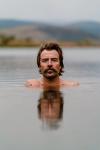

I met Micah Fink at twilight on a cold, summer day in Montana. He was the epitome of a cowboy — stoic yet witty, handsome yet rugged. A handlebar mustache to complete the ensemble.
The morning rain cleared the wildfire smoke to reveal the vistas surrounding the ranch, only long enough for the fog to roll in. A light drizzle dusted his felt cowboy hat and the lens of my camera.
We set off at dawn for a cold plunge — a routine that begins most days for Micah and the patrons in his program. The daily detox for 41 days involves Wim Hoff-inspired cold plunges, breathing meditations, a whole food diet, and a heck of a lot of cowboying.

Waking up and living in harmony with ourselves and the world is no easy feat. The veterans that are accepted into his program are tough souls, dancing with their demons and head-to-head with their (seemingly) last option. But how did they get here?
Micah infers veterans fall into a dark place of ‘experience identification.’ In the military, they take everything from you and strip you down to nothing. A malleable, blank slate they then rewire into someone fearless, disciplined, programmed.
“They get back [from war] and they’re running this weird [internal] programming that is not compatible here [in society]. Over there, you’re serving the country. Fighting for freedom. And then they come home and have no spatial awareness of who they are, they’re just zoned out of reality. They can’t even feel the snow falling on their heads. And yet, there is also something special about the individual that believes in something so much they’re willing to die for it.”
The Heroes & Horses program exists at the intersection of adversity and self-discovery. It’s about taking yourself through something very uncomfortable, on your terms. The decision to go to the ranch and show up daily is the first step. What follows is a psychological, physiological choice to overcome and manifest something different.
The program is arduous. Every day from sun-up to sun-down the vets hone backcountry mastery, pack training, stock management, wrangling and shoeing, equine medicine, addressing problem horses, and hands-on skills they need to work as a real cowboy on any ranch. The most difficult challenge lies at the end of the program when they head into the rugged Beartooth Mountains for 11 days of high-altitude travel where all of their new skills will be put into practice.
The similarities between breaking a horse, and breaking a human’s programming are foundational. “These guys are tough. Just like working with a tough horse, you have to promote what’s right, very subtly. And sometimes the dial goes up and there’s a lot of pressure. And eventually, they find what’s right and begin to hunt for that. It’s promoting that goodness. I also do that with people throughout this whole process.” It’s like showing them a metaphorical spark and then they have to build the fire and do the work to turn it into a blaze.

When things get stressful, he encourages them to slow down and get radically committed to themselves, creating that space that allows them to move through the chaos with poise and grace, and understanding. They have to find for themselves what works right for their own life.
What Micah has created is a human development program. He’s imparting veterans with the art of conscious living. “Know thyself,” an ancient Stoic philosophy, comes to mind. He is helping vets get tuned into their intuition; a fundamental human instinct. “What you believe is what you’re living and creating, no matter what comes your way. You walk through it and have the ability to make a choice. It’s in those choices that you create your own experience. My job is to draw out of them a knowledge of self.”

It’s easier to connect the dots backward in life rather than forward because forward means traversing into the unknown. That’s how we get caught in cyclical patterns. Micah believes those with PTSD get ‘mind viruses,’ or are stuck in the analytical mind. “At some point, you‘re not even a veteran. That’s just something that you did. What are you now? It’s a scary place to be. They would rather walk around in misery with a bottle of pills with everyone saying, ‘thanks for your service.’ They get a little bit of feedback from that, and play along. But they’re miserable and hate their life, they don’t know what they are.”

41 days of long, continuous conversations facilitated by the mountains, horses, environmental challenges, and the removal of substances — that is the core of this program. The vets also live one mile outside of basecamp, which means a minimum of 82 miles walking back and forth during the program just for meals; lest they forget their journals.
Removing vices allows them to see the things that exist beyond; to look to themselves instead of outsourcing their life to somebody (or something) else. It’s an opportunity for them to become more of what they are.
Like a vessel, being content whether empty or full. Simple, and yet wildly profound. Trauma and pain, joy and happiness are all woven into the fabric of our lives. Contrast is necessary and the hills of Montana reveal how to find balance in that chaos.
When vets leave the program, they know their choices won’t be the same, and they recognize that their experiences are what they create. The remote application of the wilderness allows them to recount, ‘what do I need? What truly matters?’ I drove away from the Heroes & Horses ranch with the heartfelt reminder that living and being alive are two very different things. “We’re only here for a few winters,” Micah says.

Credits
Words & Photos
Natalie Rhea of Modern Huntsman